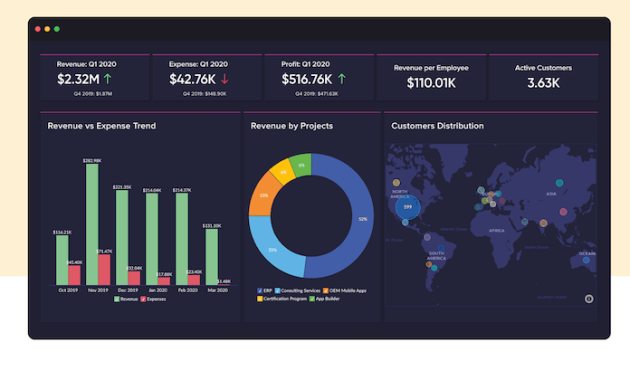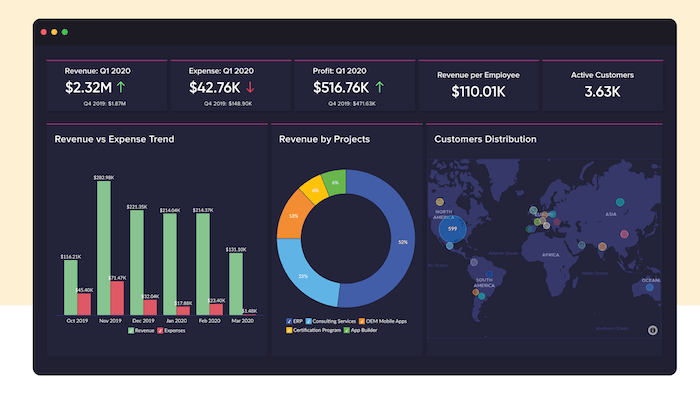
What Makes Great Business Intelligence Software Used by Experts: A Deep Dive
In the dynamic landscape of modern business, data reigns supreme. Companies are awash in information, but raw data alone is useless. The ability to transform this data into actionable insights is where the true power lies. This is where Business Intelligence (BI) software steps in. But what distinguishes good BI software from truly great BI software, the kind used by experts to drive critical decisions? This article explores the key attributes that define exceptional BI tools, examining the features and functionalities that empower professionals to unlock the full potential of their data.
The demand for sophisticated BI solutions is increasing. Businesses of all sizes are recognizing the strategic advantage of data-driven decision-making. This article will serve as a comprehensive guide to understanding what makes great business intelligence software. We will explore the essential components, functionalities, and considerations for selecting the right BI tools. This is a crucial step for any organization looking to achieve a competitive edge.
Core Functionality: The Foundation of Great BI
At the heart of any great business intelligence software lies its core functionality. This includes the ability to collect, integrate, analyze, and visualize data. The software must seamlessly connect to various data sources, including databases, spreadsheets, cloud services, and more. Data integration is paramount. It involves cleaning, transforming, and consolidating data from disparate sources into a unified view. This process ensures data accuracy and consistency.
Powerful analytical capabilities are also essential. Great business intelligence software provides a range of analytical tools. These tools include statistical analysis, predictive modeling, and data mining. These tools help users uncover hidden patterns, trends, and anomalies. These insights are the foundation for informed decision-making. Furthermore, the software should offer robust visualization capabilities. This allows users to present complex data in an easily understandable format. Charts, graphs, and dashboards are crucial for communicating insights effectively.
Data Integration and Connectivity: A Seamless Approach
The ability to connect to various data sources is critical. Great business intelligence software must support a wide range of data connectors. This includes connectors for popular databases. It also includes connectors for cloud storage services. The software should easily integrate with enterprise resource planning (ERP) systems. It should also easily integrate with customer relationship management (CRM) systems. This allows for a comprehensive view of the business.
Data transformation capabilities are also important. The software should provide tools for data cleaning, transformation, and preparation. This ensures the quality and consistency of the data. Data governance features are also essential. These features help to manage data security and compliance. They also help to control data access. Robust data integration capabilities are vital for any great business intelligence software.
Advanced Analytics and Predictive Modeling: Uncovering Hidden Insights
Beyond basic reporting and dashboards, great business intelligence software offers advanced analytical capabilities. These capabilities enable users to go beyond descriptive analysis. This means they can uncover insights that drive strategic decisions. Predictive modeling is a key feature. It uses historical data to forecast future trends and outcomes. This allows businesses to anticipate changes. They can proactively adjust their strategies.
Statistical analysis tools are also important. These tools help users identify significant relationships within the data. They also help to test hypotheses. Data mining capabilities allow users to discover hidden patterns and anomalies. This can reveal opportunities for improvement or areas of risk. The ability to perform advanced analytics is a key differentiator for great business intelligence software.
Data Visualization and Dashboards: Communicating Insights Effectively
The ability to communicate complex data in an easily understandable format is essential. Great business intelligence software excels in data visualization. It provides a wide array of charts, graphs, and other visual representations. These tools allow users to quickly grasp key insights. Dashboards are a crucial component of effective BI. They provide a centralized view of key performance indicators (KPIs). They also provide real-time data updates.
Customization options are also important. Users should be able to tailor dashboards to their specific needs. The software should also support interactive dashboards. This allows users to explore data in more detail. The ability to create and share compelling visualizations is a hallmark of great business intelligence software.
User Experience and Ease of Use: A User-Friendly Interface
Even the most powerful BI software is useless if it is difficult to use. Great business intelligence software prioritizes user experience. It offers an intuitive interface. This makes it easy for users of all skill levels to navigate and analyze data. The software should provide clear and concise instructions. It should also offer helpful tutorials and documentation. This helps users get started quickly and effectively.
Mobile accessibility is also becoming increasingly important. Users need to access their data on the go. The software should offer mobile-friendly dashboards and reports. This allows for real-time monitoring and decision-making. A user-friendly interface is essential for maximizing the value of great business intelligence software.
Scalability and Performance: Meeting Growing Needs
Businesses evolve. Their data needs also grow. Great business intelligence software must be scalable. It should be able to handle large volumes of data. It should also be able to accommodate an increasing number of users. The software should offer high performance. It should respond quickly to queries and data updates.
Cloud-based BI solutions offer excellent scalability. They can easily adapt to changing business needs. On-premise solutions may require more infrastructure investment. However, they can provide greater control over data and security. Choosing the right solution depends on the specific needs of the business. Scalability and performance are critical considerations for any great business intelligence software.
Security and Governance: Protecting Sensitive Information
Data security is paramount. Great business intelligence software incorporates robust security features. These features protect sensitive data from unauthorized access. The software should offer role-based access control. This allows administrators to restrict access to specific data. It also allows them to restrict access to specific functions. Data encryption is also essential. This protects data both in transit and at rest.
Data governance features are also important. These features ensure data quality and compliance. They also help to maintain data integrity. Organizations must implement strong security and governance practices. This protects their data and ensures compliance with regulations. Security and governance are non-negotiable aspects of great business intelligence software.
Integration with Other Tools: Creating a Unified Ecosystem
BI software rarely operates in isolation. Great business intelligence software seamlessly integrates with other business applications. This includes ERP, CRM, and marketing automation platforms. Integration allows for a unified view of the business. It also streamlines workflows. This also improves decision-making.
API support is crucial. This allows for custom integrations. It also allows for the extension of the software’s functionality. Integration with other tools is essential for creating a unified data ecosystem. This maximizes the value of the BI investment.
Expert Opinions: What the Professionals Say
Experts in the field consistently emphasize certain key features. They highlight the importance of data integration. They also emphasize the value of advanced analytics. User-friendly interfaces and robust security features are also top priorities. These experts often recommend solutions that offer a combination of these features.
They also stress the importance of choosing the right software. This depends on the specific needs of the business. Assessing data requirements and conducting thorough research are essential. Consulting with BI experts is also a valuable step. It ensures the selection of the most appropriate solution. [See also: Choosing the Right BI Software for Your Business]
The Future of Business Intelligence
The future of great business intelligence software is promising. Artificial intelligence (AI) and machine learning (ML) are playing an increasingly important role. These technologies automate data analysis. They also uncover insights that would be difficult to find manually. Natural language processing (NLP) is also emerging. It allows users to interact with the software using natural language queries.
Cloud-based BI solutions will continue to gain popularity. They offer scalability, flexibility, and cost-effectiveness. The focus will shift towards self-service BI. This empowers business users to analyze data. It also allows them to make informed decisions. The future of BI is about making data more accessible. It is also about making it more insightful.
Conclusion: Selecting the Right BI Solution
Selecting great business intelligence software is a strategic decision. It requires careful consideration of the business’s needs. It also requires a thorough understanding of the available options. This article has outlined the key features. These features are the hallmarks of exceptional BI tools. These features include data integration, advanced analytics, and user-friendly interfaces.
By focusing on these key elements, businesses can choose the right BI solution. They can then empower their teams to unlock the full potential of their data. They can also drive smarter decisions. They can also achieve a competitive advantage in today’s data-driven world. Investing in great business intelligence software is an investment in the future of the business.

